From fresh roots to flourishing shoots
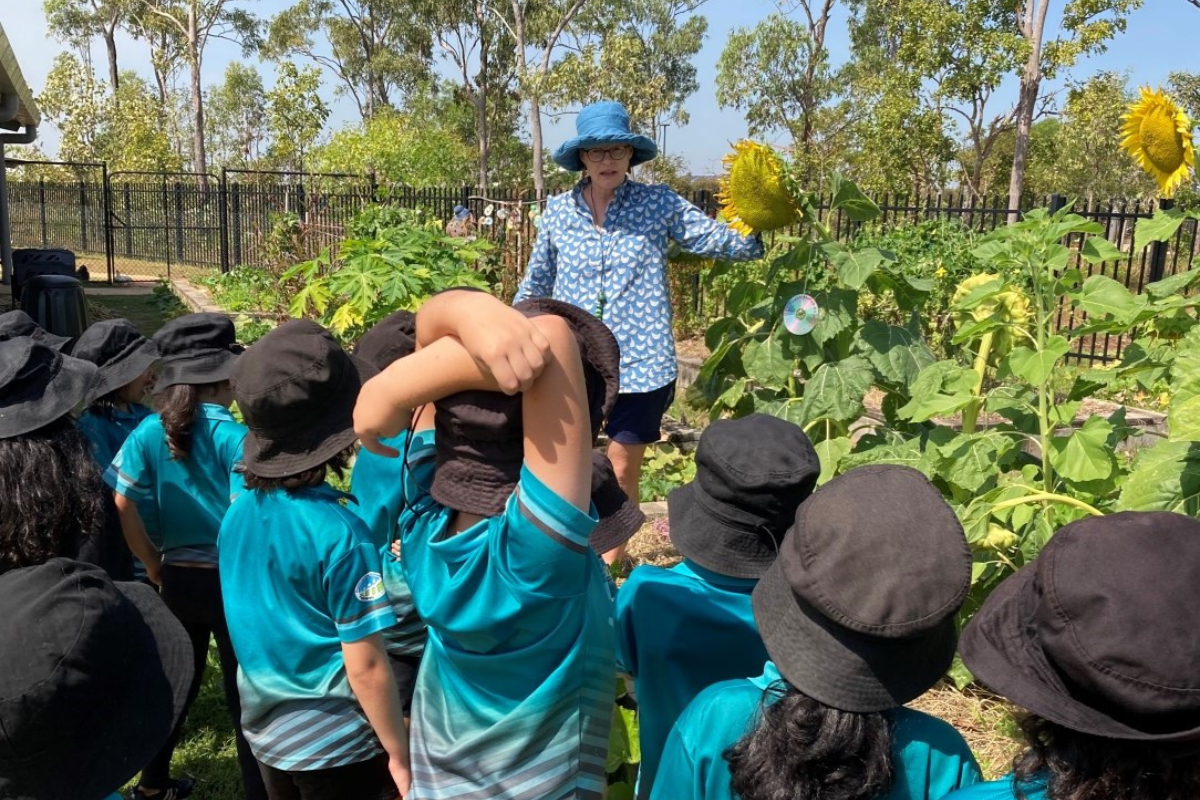
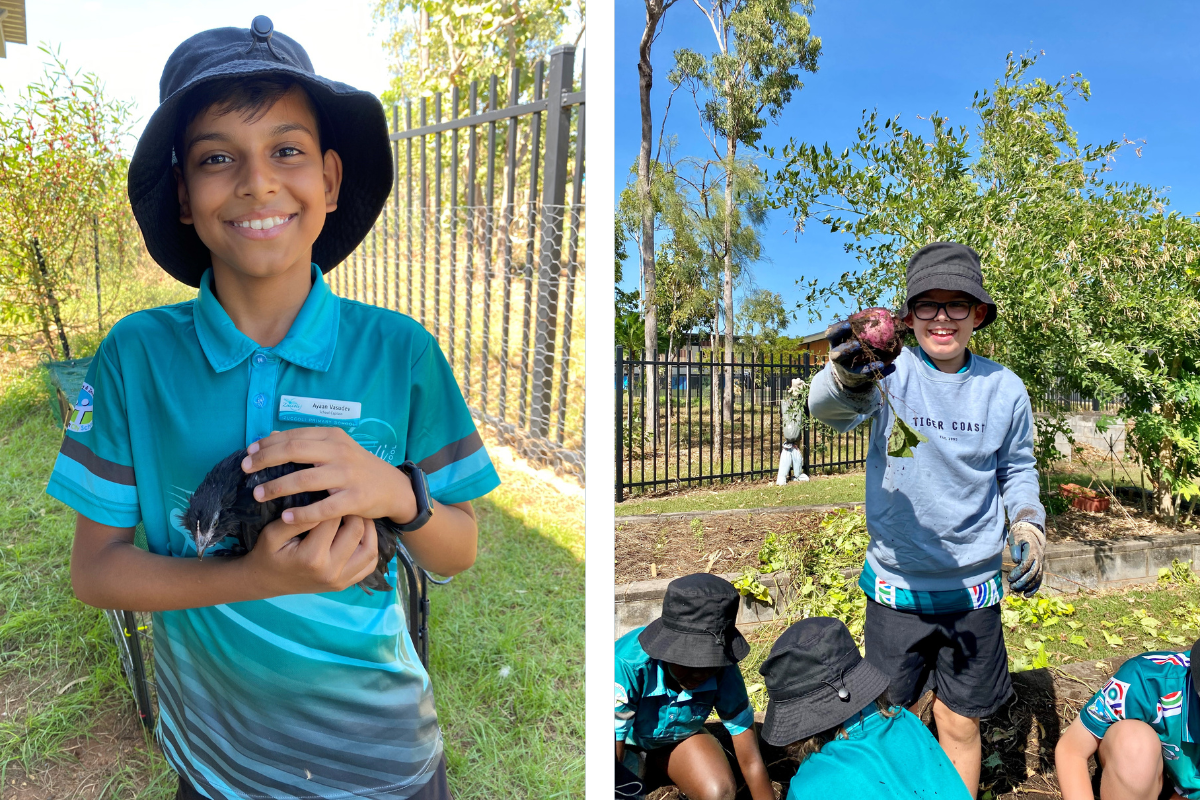
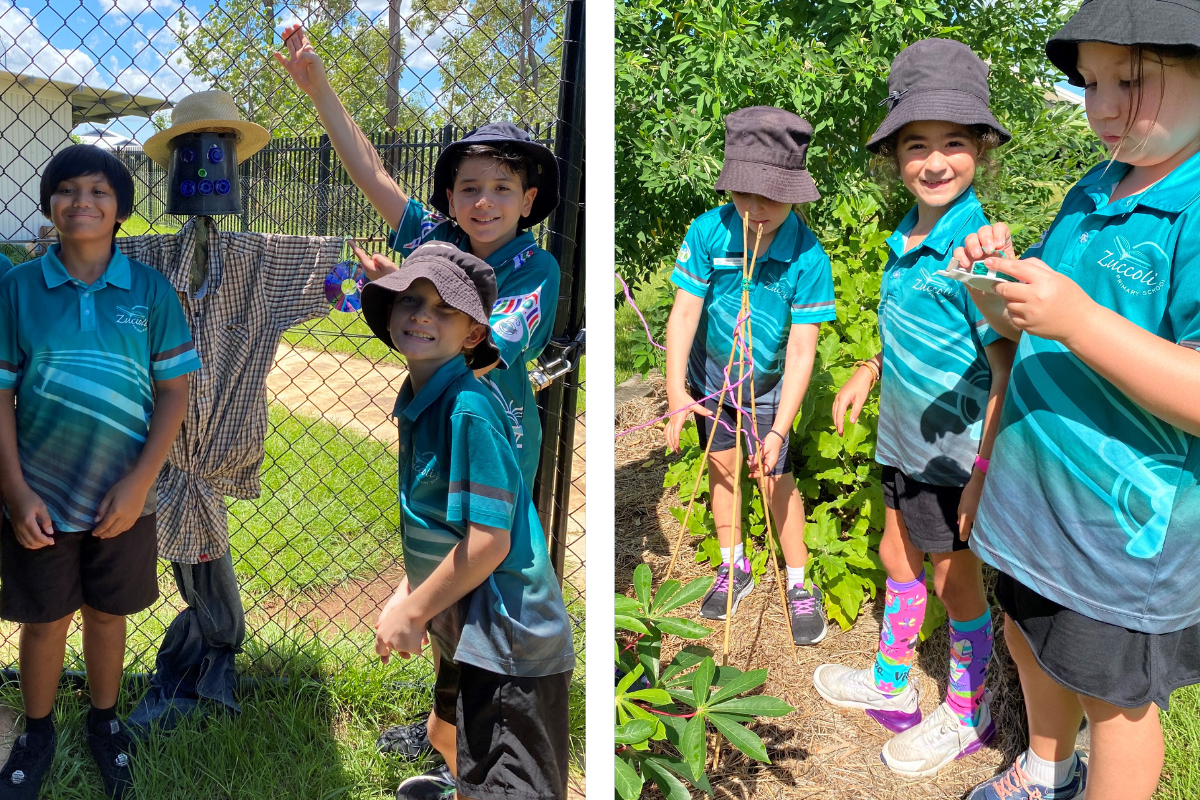
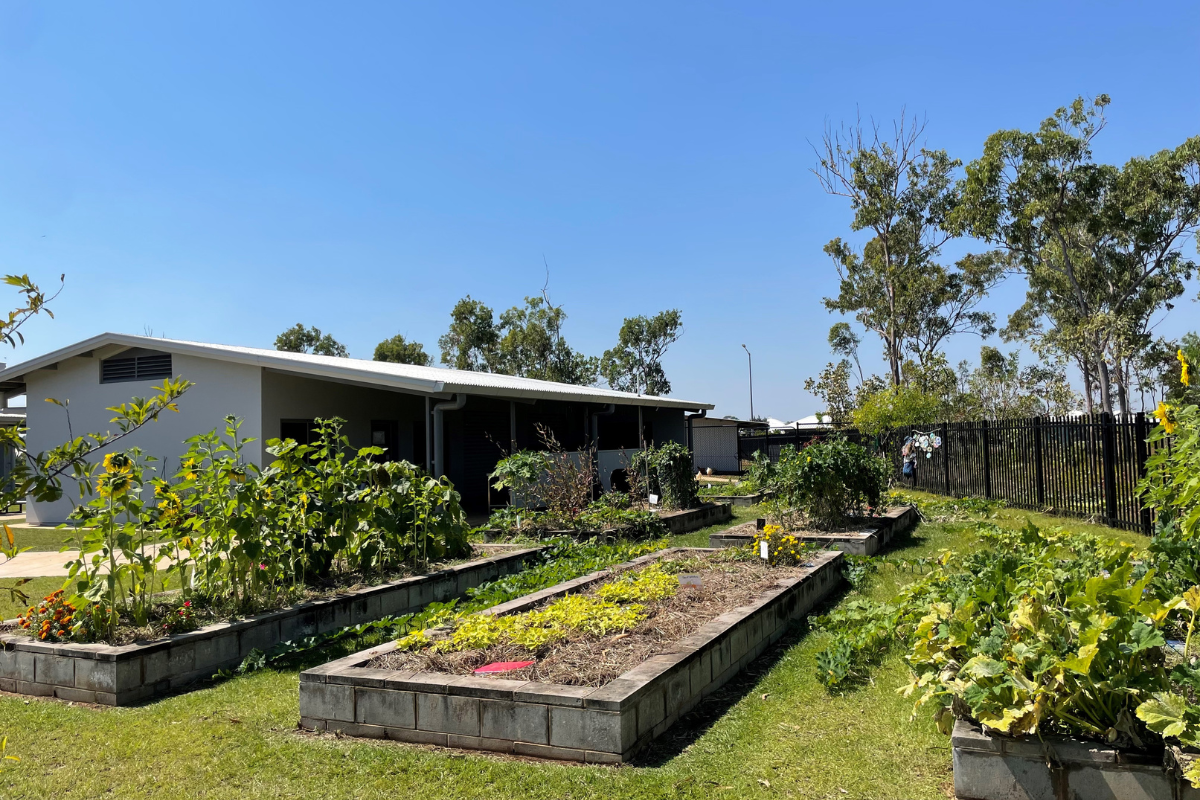
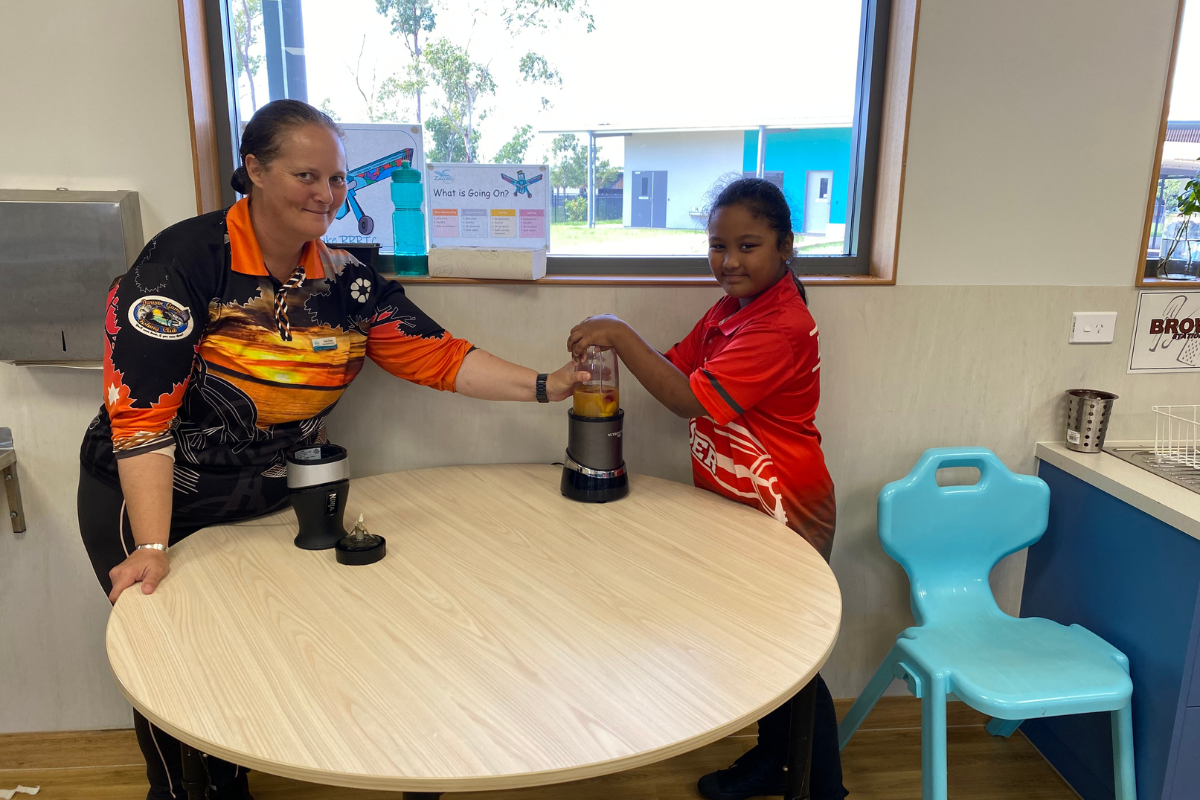
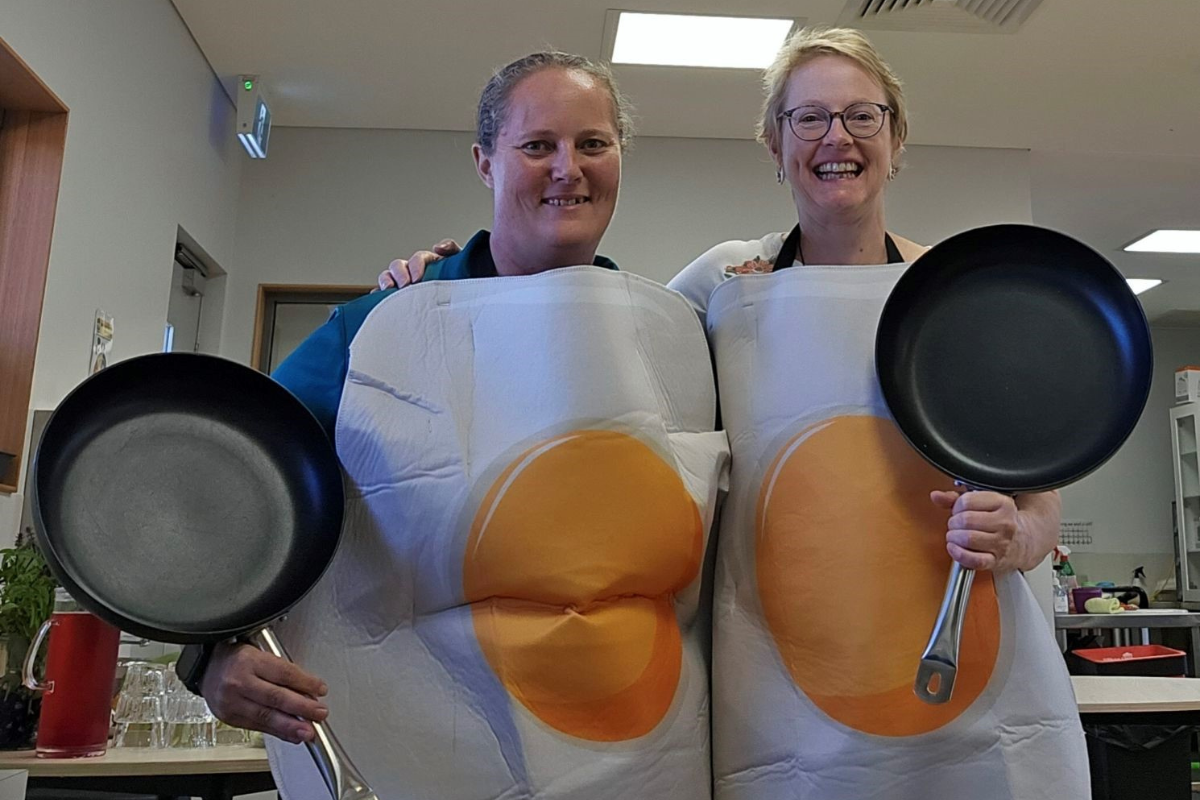
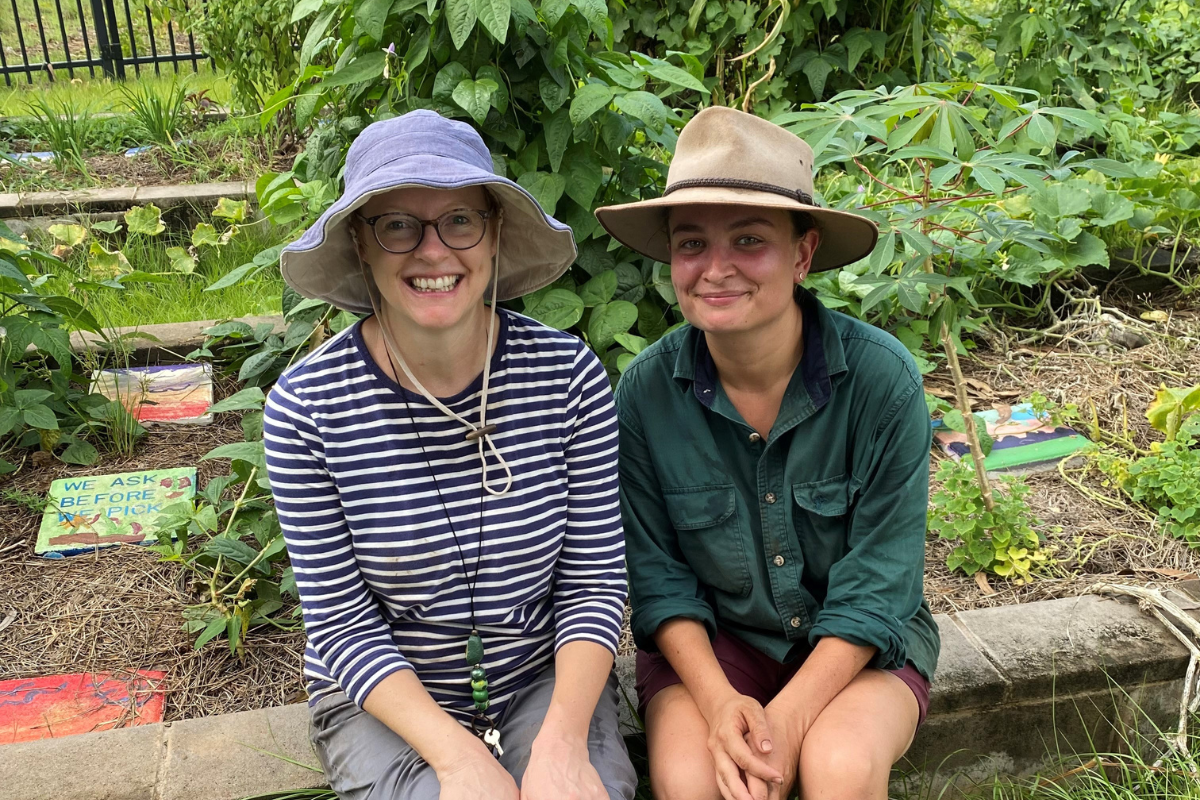
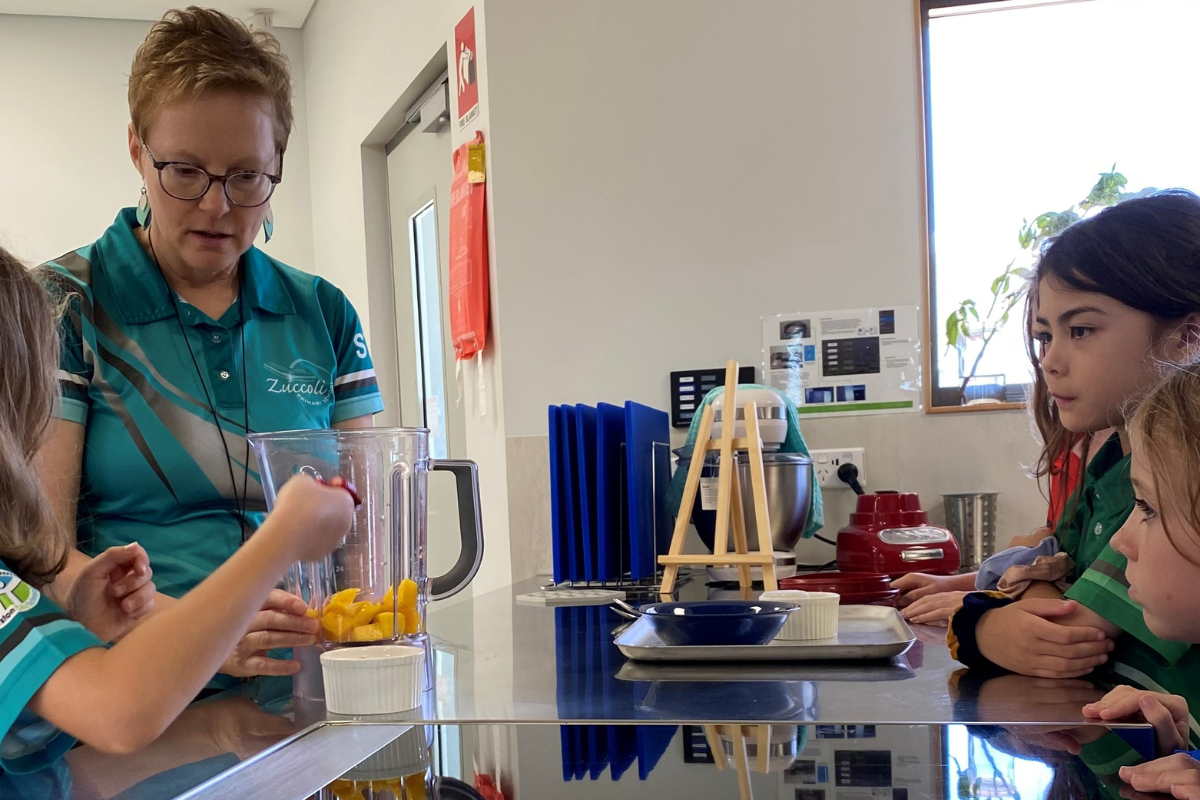
Zuccoli Primary School, in the Northern Territory, began their Kitchen Garden Program journey in 2022, with a vision that had been cooking away since this new school was developed in 2019.
Coming from another school with a successful Kitchen Garden Program, Carolyn Edwards, the school’s foundation principal, was familiar with the many educational and wellbeing benefits of the Program , and so a Kitchen Garden Program was designed in from the start.
We interviewed Christine Sapuppo, the kitchen garden teacher at Zuccoli Primary School, who walked us through the school’s experience of starting up their own Kitchen Garden Program, and their vision for the future.
Read on to learn more about how this school started small and are dreaming big with their kitchen garden!
Q: How did you start? What did you start with?
“With the principal’s support and vision, the new school was designed and built to include spaces for a Kitchen Garden Program: a purpose-built kitchen with five kitchen stations, and a garden shed/classroom with six raised garden beds and a chicken palace (aka Chook House).
When the school first opened in 2020, the student population was small. The kitchen was used by some classes, while the garden and chook shed sat in waiting for the right start-up time.
That time came in 2022, when two staff members– a kitchen garden teacher (me) and assistant (Katie Twine) – were allocated to the kitchen and garden space.
With leadership support, a budget, the help of Zuccoli students, and generous community members and staff, we prepared and planted the garden for the first time. It was wonderful how many seeds and seedlings were donated, with grants from Bunnings, Open Gardens NT and Landcare also assisting.
It was exciting to see the involvement of students and the ownership, pride, and care that they took in establishing their school garden. This is and always will be an integral aspect of the Program: students feeling ownership and connection to the kitchen and garden space.”
.png)
Zuccoli Primary School's garden space before beginning their kitchen garden program.
Q: Can you share a special story from your Kitchen Garden Program?
“A memorable moment was the introduction of the first flock of chickens to Zuccoli Primary School. The chickens were all donated from staff and kind community members.
The thrill students had when meeting the chickens is something we won’t forget. It was an absolute pleasure to see the joy on students’ faces while meeting and interacting with the flock.
We now have an established flock of hens and we have incubated eggs on two occasions. Students love feeding, cuddling, and observing the chickens.”
.png)
Students love their school's chooks.
Q: How do you currently fund the Program?
“Because our school is quite new, the Program is incorporated in our school’s budget. This support from the school leadership team has been immensely helpful in getting our kitchen garden Program up and running and keeping it flourishing.
Community partnerships have also been extremely helpful, providing both funding and local support. When we first started our Program, we received many donations of seeds and seedlings from generous families and community members.
We continue to apply for grants to supplement our school’s budget. Students also sell produce and products made in the kitchen and garden at a stall before school assemblies and for events such as Mother’s Day. The students collect cans and bottles for the ‘cash for containers’ program and all proceeds go back into the garden space.
This all assists with the ongoing costs associated with the Program and gives students a sense of ownership.”
Q: Can you describe the type of sessions you run?
“Students have blocks of time in both the kitchen and garden, with ‘odd’ weeks in the kitchen and ‘even’ weeks in the garden. This encourages connection between the spaces and allows students to prepare and share the produce they have helped to grow and harvest.
Students from Transition (Prep) to Year 6 access the Program, with upper primary sessions in Semester 1 and lower primary sessions in Semester 2. The upper primary students have one- or two-hour sessions, depending on the term, and the lower primary students have one-hour sessions. We are expanding the Program next year to increase students’ time in the space across the whole year.
Some of the garden highlights have been seeing students design and build trellises for the garden to support plants and observing students finding creative ways to deal with pests in the garden by designing wonderful pest deterrents, from scarecrows to elaborate garden art to deter corellas. Students pollinating and then harvesting the many pumpkins last year was a thrill for everyone. The pure joy of spotting pumpkins at different stages of growth and then the time for harvest was a wonderful experience. This year, the Year 5/6 classes were similarly excited digging for sweet potatoes. The students were giddy with excitement and some of them said it was like digging for gold.
Bringing what has been harvested into the kitchen is also wonderful. Last year, students loved experiencing the varieties of foods that can be made using pumpkin. They tried both savoury and sweet dishes, from sweet pumpkin muffins to pumpkin soup and pumpkin damper. This year we have been inundated with fruit from our pawpaw trees, so we have enjoyed delicious pawpaw muffins, fresh and dried pawpaw, and pawpaw ginger jam. Cooking such a variety of dishes from the one fruit or vegetable demonstrates the versatility of food and provides ample opportunities to try new combinations for some of our less adventurous children.”
.png)
Zuccoli Primary School's current flourishing garden.
Q: How do you staff the Program?
“We have one kitchen garden teacher and one assistant. Our school is growing quickly, so in 2024 we hope to expand to have two teachers and two kitchen garden assistants.
Katie Twine, who was our kitchen garden assistant in 2022, has pursued her interest in horticulture and works at a local plant nursery. Katie did much to help establish the Program, especially in the garden where her knowledge and passion for growing edibles gave us a wonderful start.
In 2023, Trudy Dacey, an experienced kitchen garden assistant, joined us. Trudy is passionate about the Stephanie Alexander Kitchen Garden Program and has over 10 years in a school kitchen under her belt which has been fantastic. Trudy also loves to come up with inventions to make both the kitchen and garden spaces practical and productive.
As the specialist teacher, I feel so blessed to work with wonderful people. This Program thrives when there is a strong team to share the workload. I have been teaching in a primary and secondary context in both classroom and specialist roles for over 20 years, but being part of a Kitchen Garden Program is a career highlight. I have always had a passion for the environment and connecting students to the world they live in - they need to understand that they can make a difference in the world. The kitchen and garden program provides so many opportunities for creativity and meaningful real-life experiences, and promotes health and wellbeing, and connection to our world. The learning opportunities are endless and so important in this fast-paced world.”
Q: What are the benefits of your Kitchen Garden Program for the students and children you’re working with?
“The wellbeing and educational benefits are endless. I think what I enjoy most is observing students questioning in these spaces and the sheer delight and wonder that comes from spending time in a garden and around animals. This, of course, extends into the kitchen where students are regularly surprised by new flavours and feel a sense of pride that comes from growing, harvesting, preparing, and sharing their own food.
One student loves the kitchen so much that he regularly makes the recipes for his family at home. He was so excited about preparing food that this led to his mum coming in to be a guest chef in the kitchen, showing a class of students how to make Indian roti bread. I know he is not the only one, and we hope to bring more families into the school to prepare and share food.”
.png)
Measuring snake beans grown by students.
Q: What have some of your challenges been?
“The Program needs to fit the school cohort and meet the needs of your students. Zuccoli is a growing new school, so we need to be flexible in our delivery while not losing the focus of connecting students across the two spaces.
We are also a very multicultural school, so using tropical ingredients from our garden in culturally diverse dishes is a must.
Trying to not get disappointed when things don’t necessarily work out is an important learning opportunity and helps both staff and students build resilience. We had a few water issues earlier this year, which was frustrating but also created teachable moments. Growing and preparing food doesn’t always work as planned but that is a great lesson for life.”
Q: Do you have any tips for those just starting out?
“A local network of schools assisted us a great deal when we were starting out. Our principal, Carolyn, designed the spaces after visiting other local schools and seeing what worked for them. I also visited many schools in the area before beginning the Program, and we adapted ideas from their Programs for us and our students.
Start small, keep it simple and build on it as you can. Try to be positive through the challenges, as there are always challenges in gardening, caring for animals and preparing food. Small steps can lead to giant leaps later.
Find the right team. Support each other. Value each other’s ideas, network, and try to engage other staff in the school to see the Program’s value and links to curriculum. Although specific staff are allocated to the Program, the Program and its kitchen and garden spaces belong to the school: all students should feel connection and ownership, and all staff should feel welcome to interact in the spaces and use the spaces.”
.png)
Preparing the garden beds in early 2022.
Q: Do you have any tips for the longevity of a Program?
“For it to last, you need leadership support, and for the Program to be valued. Leadership support has been integral to the Program’s success thus far and has meant the Program is set to grow and expand in 2024. I couldn’t be more thankful for that. Being passionate and dedicated to the Program is key, but without support it would not be sustainable.
Life skills, preparing global citizens, and encouraging sustainability, health and wellbeing are all key to the Program and essential, but come easily in these spaces, which present real-life opportunities.”
Members can see more photos from Zuccoli Primary School on the Shared Table.
This story is part of a series, published in celebration of Kitchen Garden Month, with the aim of spotlighting Kitchen Garden Program member schools that started small and dreamt BIG!
- Engage with our Kitchen Garden Month resources by visiting our Kitchen Garden Month page.
- Find out more about Kitchen Garden Program memberships by visiting the membership page.
< Back to Latest News
